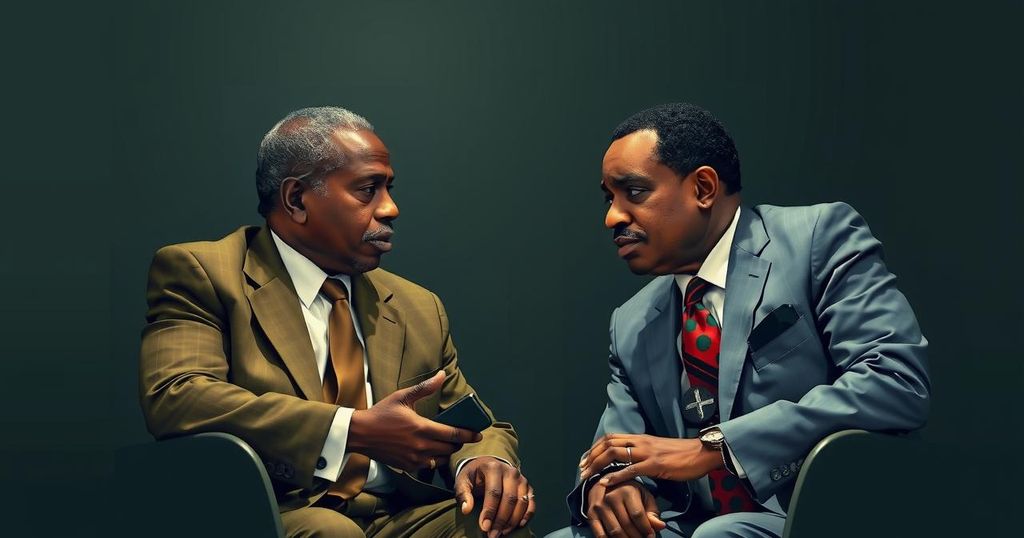The Democratic Republic of the Congo faces significant challenges due to ineffective leadership, characterized by ethnic tensions and political strife. Patrick Loch Otieno Lumumba and Kwame Nkrumah highlight the ongoing sadness of the DRC, while current politicians exacerbate divisions through inflammatory rhetoric. The reflection on past leadership, particularly Mobutu Sese Seko’s attempts at unity, reveals a longing for cohesive governance amidst a fragmented political landscape.
The narrative of the Democratic Republic of the Congo (DRC) is heavily characterized by an overwhelming sense of despair, as articulated by Patrick Loch Otieno (PLO) Lumumba, who asserts that the DRC’s plight is fundamentally tragic. Kwame Nkrumah posited that the future of the Congo could only be secured through the unification of Africa under a continental governance model. Currently, the DRC’s leadership appears to reinforce systemic issues, as evidenced by the actions of Justice Minister Constant Mutamba, who incited prisoners to aid in his ambition to apprehend Rwandan President Paul Kagame, while vowing to execute supporters of the M23 rebel group, whom he portrayed as adversaries. Such statements reflect a troubling trend of ethnic scapegoating, with accusations of persecution against President Félix Antoine Tshisekedi regarding the treatment of Kinyarwanda-speaking individuals.
This situation becomes even more complex with Foreign Affairs Minister Thérèse Kayikwamba’s derogatory reference to the M23 as “the so-called Congolese,” despite her own background as a daughter of a German immigrant. This raises questions of legitimacy and inclusion within the DRC, particularly when historical ties to the land are considered. The prevailing narrative further illustrates a disconnection between leadership and the populace, as government officials continue to disparage segments of their own society.
President Tshisekedi’s stance towards Rwanda, interpreted as a perpetual state of war, encapsulates the broader conflict faced by the DRC. Nkrumah theorized that the root cause of the DRC’s myriad issues lies in its leadership, emphasizing the political failures post-Lumumba, whom he viewed as the nation’s last true leader. Subsequent leaders such as Joseph Kasavubu and Mobutu Sese Seko were characterized as traitors who perpetuated colonial pawns in a post-independence era. Even Mobutu, often criticized, demonstrated a semblance of national unity through his slogan promoting collective identity.
Conversely, current leadership appears to exacerbate divisions, with many citizens expressing nostalgia for Mobutu’s governance amidst a landscape rife with ethnic tensions and unsatisfactory political representation. In this context, Rwanda’s President Kagame has publicly distanced himself from the notion of conflict, recognizing the detrimental consequences of war. The prevailing sentiment within some Congolese circles reveals a yearning for Mobutu’s era of cohesion, suggesting a disillusionment with contemporary governance.
The Democratic Republic of the Congo has a long history of political turmoil, marred by leadership crises and ethnic conflicts. Following independence, the assassination of its first prime minister, Patrice Lumumba, set the stage for decades of instability, characterized by tyrannical leadership and foreign interference. Leaders like Mobutu were viewed as flawed yet preferable due to their attempts at fostering national unity amid pervasive divisions. The current political climate continues to showcase deep-seated ethnic strife, particularly towards the Tutsi community associated with the M23 rebellion. This ongoing ethnic tension raises serious concerns about governance, representation, and human rights within the country. Amidst this backdrop, various leaders express sentiments that perpetuate division, prompting calls for a more unified approach among African nations to secure a peaceful future for the DRC.
In summary, the Democratic Republic of the Congo is at a critical juncture, grappling with the legacy of inadequate leadership and deep-rooted ethnic divisions. Calls for a unified Africa, as proposed by historical figures like Kwame Nkrumah, resonate in light of ongoing strife. The rhetoric from current leaders further complicates this landscape, illustrating the need for introspection and a strategic shift towards unity and inclusivity for a promising future. Only through coherent and empathetic leadership can the DRC emerge from its cycle of despair.
Original Source: www.newtimes.co.rw






